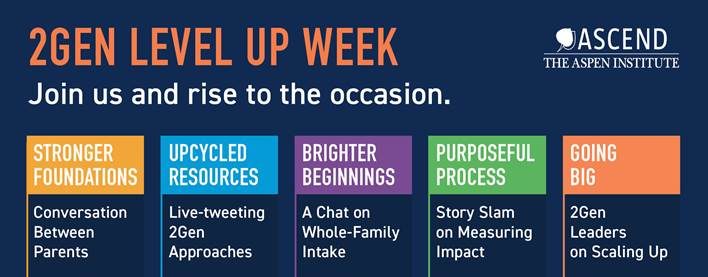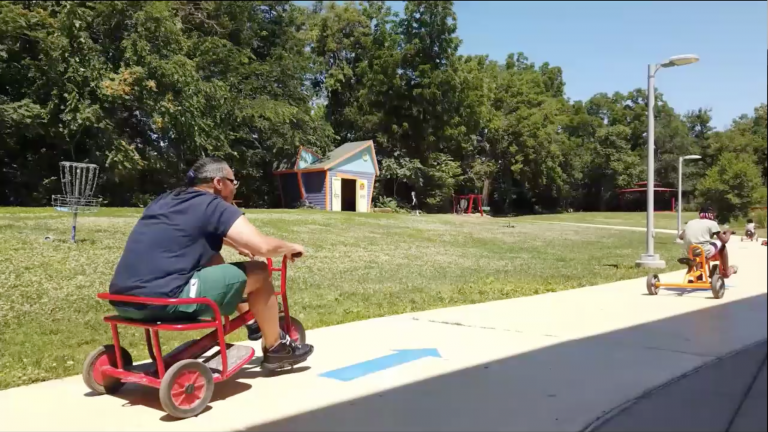WEBINAR: Supporting Student Parent Families in a Time of Crisis
As the hub for breakthrough ideas and collaborations that move children and their parents toward educational success and economic security, Ascend is intensifying its efforts in the midst of the coronavirus pandemic to highlight 2Gen solutions that Ascend Fellows and the Ascend Network have developed over the past decade to help families reach their potential. Ascend is examining how new solutions, anchored in a 2Gen approach, can build and improve long-term outcomes that stabilize the health, economic well-being, and education of families as they recover and move forward from the COVID-19 crisis.
In a series of webinars, Ascend will tap the insights, expertise, and resources of the Ascend Network, Ascend Fellows, parents, and policy partners to offer solutions for how best to assist families now and ensure they have a stronger, more equitable future. Read on to learn about the Supporting Student Parent Families in a Time of Crisis webinar, and visit this page to learn more about the series.
Supporting Student Parent Families in a Time of Crisis: Students who are parents, often the most high-performing students, are facing heightened financial insecurity during the current economic downturn and an unprecedented spike in unemployment. As colleges, workforce development programs, service providers, policymakers, and advocates prepare relief and recovery measures, the unique needs of postsecondary students with children must be considered to ensure they are supported now and in the future.
Speakers:
- Anne Mosle, Vice President at the Aspen Institute, Executive Director, Ascend, Co-Chair, Aspen Forum on Women and Girls
- Jesus Benitez, Ascend Parent Advisor and Mentor Coordinator, City University of New York (CUNY) Fatherhood Academy
- Nicole Lynn Lewis, Founder and CEO, Generation Hope
- C. Nicole Mason, Ascend Fellow and President and CEO, Institute for Women’s Policy Research (IWPR)
- Mark Mitsui, President, Portland Community College (PCC)
The webinar was moderated by David Croom, assistant director for postsecondary achievement and innovation at Ascend, and Lindsey Reichlin Cruse, study director at the Institute for Women’s Policy Research.
Watch the webinar recording here. Download the presentation here.
Before restrictions due to the coronavirus pandemic were put into place, students who are parents already faced challenges while striving to attain higher degrees and workforce credentials. The pandemic has magnified their hurdles from access to quality child care and managing course work to food insecurity and unemployment. However, this unprecedented time is also an opportunity to build capacity to serve this unique population at the community and institutional levels.
C. Nicole Mason, Ascend Fellow and president and CEO of the IWPR, said due to employment loss there will not be a “one for one replacement.” As a result, many women who lead households will not return to work soon or have the same jobs.
“We need to make sure they have the financial supports and social supports they need to not only meet their day-to-day needs but also for the future,” Mason said. “What that will mean for many women and their families is upscale training and the opportunities not only to continue their education but also provide opportunities for working families and parents to be able to access education.”
As the father of his young son, Jesus Benitez, an Ascend Parent Advisor and mentor coordinator at the CUNY Fatherhood Academy, said being in quarantine has exhausted him mentally given that he has begun to look after his younger brother, while their mother work several jobs.
“Everything shifted because normally my schedule was from nine to nine, from work to school, and I would come home at 10 pm, get ready to study or try to do an essay. And it was strange to feel like everything was on top of me. I felt like I was a teacher, a principal — I was a full-time parent to not one but two kids. It was so heavy for me.”
As president of PCC, Mark Mitsui said the concerns of student parents during COVID-19 are imperative and highlighted PCC’s statewide initiative, Pathways to Opportunity, as a key program aimed at closing the opportunity gap for students with low incomes who experience food and housing insecurity and are in need of benefits such as unemployment, emergency funding, SNAP, among others.
“What Pathways to Opportunity is about is trying to connect the dots between the different forms of public benefits,” Mitsui said. “This started a couple years ago and we’re glad we did because now with COVID-19, the need for these benefits is even greater.”
Nicole Lynn Lewis, founder and CEO of Generation Hope, said the organization responded to the pandemic by creating “as much consistency” by way of virtual supports for their scholars.
“In addition to moving all of our case management and our one-on-one mentoring work online, we immediately distributed our own emergency grants to each student and have made rapid connections to community resources,” Lewis said.
Questions from Participants
Has IWPR updated the Childcare for Parents in College: A State by State Assessment since 2016?
Lindsey Reichlin Cruse: We have not updated that report since then. If there is specific information you’re interested in, you are welcome to email me and maybe we can help! reichlin@iwpr.org
Can we discuss strategies for protecting student parents who are “essential” workers (and predominantly women/WoC) but who are also being treated as disposable in their COVID-19 exposure risk? Any ideas on ways higher-ed or articulating organizations can advocate for them?
Nicole Lynn Lewis: These are important considerations as higher-ed thinks through its emergency funding for students during COVID-19. Because women of color are disproportionately being affected by the virus and at higher risk of being exposed, alleviating the financial pressures that they are experiencing right now is key. Institutions should be asking — what is the process for distributing these funds and ensuring that they are being utilized by this group, particularly by those who are parenting?
Lindsey Reichlin Cruse: Advocating for paid sick leave for all workers is critical to protecting essential workers’ well-being, including paid leave to care for sick family members.
How have you addressed the potential for debt of parent students to their postsecondary institutions because they dropped a class? While it is not their fault, it could hinder their ability to enroll for the next term.
Jesus Benitez: Yes! We have a plan for students that want to drop out of classes, so it won’t affect them. The semesters at LaGuardia Community College are very different and classes can be adjusted in such a way to accommodate students. So we use that for our advantage when we help student parents in general.
Can we get the link to the new CLASP report?
Portia Polk: There are two recent reports related to our conversation: Unemployment Compensation: A Guide for Child Care Stakeholders During the Coronavirus Pandemic and Why We Need $50 Billion in Pandemic Child Care Relief: A State-by-State Estimate.
With the country anticipating slow economic recovery, how is Portland Community College thinking about supporting recent graduates (specifically in workforce training) that are looking for careers?
Mark Mitsui: Our career centers are now all online and virtually available to graduates. Services include lists of employers who are hiring, updated on a daily basis, and webinars. We also have Worksource Centers at our college and partnership with other centers around our region that not only link employers to students/graduates but also link students/graduates to public benefits. Each Career Technical Education program also has industry advisory committees, and faculty often refer both current students and graduates to employers and vice versa.
California is anticipating a $1.1 billion cut for our community colleges if the federal government doesn’t step in — what are some advocacy groups in CA (or nationally) that I can tap into so that the cuts aren’t disproportionally impacting our student parents?
Mark Mitsui: I am not sure about advocacy groups specifically for student parents in the community colleges in California. For community colleges in general, I imagine that you are probably already aware of the Community College League of California, led by Larry Galizio. The League advocates for CC funding in California.
I didn’t notice child support listed on Mark’s slide describing all the programs/systems that student parents may need to navigate. Have they thought about connecting students to that system (when needed)?
Mark Mitsui: Great suggestion, thank you. We will explore.
Who are the folks on the Ascend team working on rural issues?
David Croom: Sorry for any confusion! Per Anne’s remarks, we have three institutions taking part in the Leadership Circle (college leaders focused on student parent success) that are at in mostly rural settings: Sitting Bull College (ND), Colorado Mountain College (CO), and Washington County Community College (ME).
What are child care options that colleges are providing in lieu of campus closures?
Lindsey Reichlin Cruse: I’m honestly not sure what colleges can do now that their centers are closed. I have heard of one contracting with centers that are still open in the community, but that won’t be an option for most. Some CCAMPIS and campus child care programs are diverting grant funds to help support social and emotional needs of children and their families, as one example of how they are pivoting, but that doesn’t solve their need for child care. I wish I had more insight!
I know a lot of faculty/instructors are also struggling with distance learning. Is there some kind of professional development or technical assistance that could help them understand how to make things work better for their parenting students?
Nicole Lynn Lewis: Flexibility and empathy are key here. It’s vitally important that professors are creating trust and open lines of communication for students during COVID-19. We talk a lot about student-first learning, and it’s a necessity in light of COVID-19 if we want students to be successful and stay in school. Generation Hope has some guidance for faculty in our recent blog post on how institutions can adapt to meet the needs of student parents during COVID-19 here.
Jesus Benitez: Neil Roberts, a professor of Africana Studies at Williams College, made a video about the importance of combining Synchronous Learning and Asynchronous Learning in Online Education.
Does Gen Hope offer technical assistance?
Nicole Lynn Lewis: Yes, Generation Hope is offering technical assistance to colleges, universities, and foundations to assist in improving outcomes for student parents. Please contact our Chief Operating Officer, Reginald M. Grant, at reginald@supportgenerationhope.org for more information.
Can Ascend and IWPR assist with bringing financial aid organizations into this need for identifying student parents?
Lindsey Reichlin Cruse: IWPR will soon be releasing a briefing paper describing available data on student parents, opportunities to enhance student parent data sources, and suggestions for data collection methods. This brief helps make the case for why better data on parenting students can improve how institutions learn about their students’ experiences and design interventions to improve their outcomes.
David Croom: We have a brief series coming out in a couple months – one of the briefs is focused on the need to identify student parents on campuses and it provides some examples. Another brief in the series is focused on financial supports for parents. I agree though about bringing on financial aid organizations as stakeholders– we’ll be sure to include them in a future convening.
For institutions grappling with academic scheduling for Fall 2020, are there any recommendations by the panelists to ensure that academic schedules are as student parent-friendly as possible?
Nicole Lynn Lewis: Two things to point out here. One, priority registration for students with children is extremely helpful – even for online classes or a hybrid model of online and in-person. Parenting students are navigating college with 50 percent less time than their peers on average between work and parenting, and this is likely even less with the current impacts of COVID-19. They do not have the same flexibility in their schedules as their non-parenting peers. Two, there aren’t enough evening and weekend classes, particularly at four-year institutions. Not being able to take a class during these “off hours” can delay graduation or force students to change their major. Does the pandemic provide opportunities for more course offerings during evenings and weekends, especially for classes that are related to a student’s major?
The photo above is a part of a collaboration between the Seldin/Haring-Smith Foundation and Getty Images. The New College Majority Photo Series highlights the demographics of today’s college students. Currently, 22% of all college students are also parents.
Related Posts















